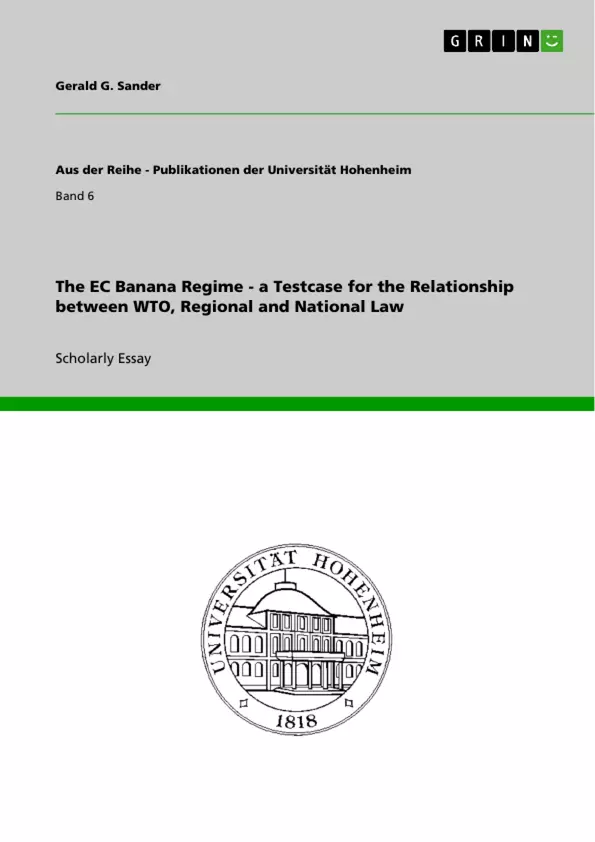
The EC Banana Regime - a Testcase for the Relationship between WTO, Regional and National Law
Wissenschaftlicher Aufsatz, 1998
9 Seiten
Jura - Europarecht, Völkerrecht, Internationales Privatrecht
Leseprobe
Inhaltsverzeichnis (Table of Contents)
- I. The EC common market organization for bananas
- II. WTO Panels relating to the EC banana regime
- III. Judgment of the European Court of Justice
- 1. Germany v. Council [Bananas]
- 2. Criticism of this judgment
- V. Conclusion
Zielsetzung und Themenschwerpunkte (Objectives and Key Themes)
The primary objective of this work is to analyze the legal complexities surrounding the EC banana regime, specifically examining the relationship between WTO law, regional EC law, and national law. The focus is on how the banana regime, with its discriminatory aspects, navigates the interplay of these legal frameworks and the resulting legal challenges it presents.
- The EC banana regime's discriminatory nature and its impact on banana producers and importers
- The role of WTO panels in addressing the regime's incompatibility with international trade law
- The European Court of Justice's controversial judgment on the relationship between WTO and EC law in the context of the banana regime
- The legal and political implications of the EC banana regime for both the European Community and member states
Zusammenfassung der Kapitel (Chapter Summaries)
Chapter I details the establishment of the EC banana regime as a response to the need for harmonizing national regulations within the internal market. It outlines the regime's discriminatory features, including tariff quotas and licensing requirements, which favor banana producers from ACP countries over third-country producers.
Chapter II focuses on the WTO panels that have addressed the legality of the EC banana regime. It highlights how multiple panels, including the 1994 and 1997 panels, found the regime to violate GATT provisions. This chapter also delves into the Framework Agreement on Banana Imports, which attempted to address the concerns raised by the panels but ultimately failed to eliminate the regime's discriminatory nature.
Chapter III examines the European Court of Justice's landmark ruling in the case of Germany v. Council [Bananas]. This chapter analyzes the court's decision to reject Germany's claim that the banana regime violated both Community law and GATT law. The focus is on the court's reasoning for denying the direct effect of GATT provisions within the Community legal order.
Chapter V presents the author's conclusions, which are excluded from this preview to avoid spoilers.
Schlüsselwörter (Keywords)
The work centers around the EC banana regime and its implications for international trade law. Key terms and concepts include WTO law, GATT 1994, European Community law, dispute settlement mechanisms, direct effect of international agreements, discriminatory trade practices, tariff quotas, licensing requirements, and the relationship between regional and national law.
Frequently Asked Questions
What was the purpose of the EC banana regime established in 1993?
It was designed to create a common market organization for bananas, replacing various national arrangements within the European Community.
Why was the banana regime considered discriminatory?
It favored producers from ACP (African, Caribbean, and Pacific) countries through duty-free imports and quotas, while imposing high tariffs on third-country producers.
How did the WTO react to the EC banana regime?
Multiple WTO panels found the regime to be in violation of GATT (General Agreement on Tariffs and Trade) rules due to its discriminatory nature.
What was the significance of the "Germany v. Council" case?
The European Court of Justice (ECJ) rejected Germany's challenge to the regime, ruling that GATT rules do not have direct effect within the Community legal order.
What happened to Germany's special status regarding bananas after 1993?
Before the regime, Germany had a protocol allowing tax-free imports, which was abolished by the new common market organization, leading to higher prices and legal disputes.
Details
- Titel
- The EC Banana Regime - a Testcase for the Relationship between WTO, Regional and National Law
- Hochschule
- Eberhard-Karls-Universität Tübingen (Law)
- Autor
- Dr. Gerald G. Sander (Autor:in)
- Erscheinungsjahr
- 1998
- Seiten
- 9
- Katalognummer
- V7266
- ISBN (eBook)
- 9783638145770
- Dateigröße
- 552 KB
- Sprache
- Englisch
- Schlagworte
- WTO EuGH Internationales Wirtschaftsrecht international economic law
- Produktsicherheit
- GRIN Publishing GmbH
- Preis (Ebook)
- US$ 6,99
- Arbeit zitieren
- Dr. Gerald G. Sander (Autor:in), 1998, The EC Banana Regime - a Testcase for the Relationship between WTO, Regional and National Law, München, Page::Imprint:: GRINVerlagOHG, https://www.diplomarbeiten24.de/document/7266
- Autor werden
- Ihre Optionen
- Vertriebskanäle
- Premium Services
- Autorenprofil
- Textarten und Formate
- Services für Verlage, Hochschulen, Unternehmen

- © GRIN Publishing GmbH.
- Alle Inhalte urheberrechtlich geschützt. Kopieren und verbreiten untersagt.
- info@grin.com
- AGB
- Open Publishing
Der GRIN Verlag hat sich seit 1998 auf die Veröffentlichung akademischer eBooks und Bücher spezialisiert. Der GRIN Verlag steht damit als erstes Unternehmen für User Generated Quality Content. Die Verlagsseiten GRIN.com, Hausarbeiten.de und Diplomarbeiten24 bieten für Hochschullehrer, Absolventen und Studenten die ideale Plattform, wissenschaftliche Texte wie Hausarbeiten, Referate, Bachelorarbeiten, Masterarbeiten, Diplomarbeiten, Dissertationen und wissenschaftliche Aufsätze einem breiten Publikum zu präsentieren.
Kostenfreie Veröffentlichung: Hausarbeit, Bachelorarbeit, Diplomarbeit, Dissertation, Masterarbeit, Interpretation oder Referat jetzt veröffentlichen!
- GRIN Verlag GmbH
-
- Nymphenburger Str. 86
- 80636
- Munich, Deutschland
- +49 89-550559-0
- +49 89-550559-10
- info@grin.com
-









